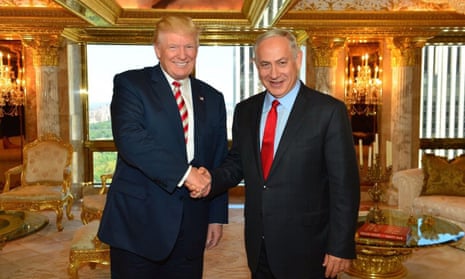Donald Trump attempted to draw parallels between Israel’s separation barrier and his much-touted border wall pledge on Sunday after both presidential nominees met the Israeli prime minister, Benjamin Netanyahu.
In Trump’s hour-long meeting with Netanyahu at his Trump Tower penthouse, the two reportedly discussed “at length Israel’s successful experience with a security fence that helped secure its borders”, according to the Trump campaign.
Israel’s separation barrier runs for 440 miles (700km) partly along the 1949 armistice lines set after Israel’s war for independence and partly through territory occupied by Israel after the 1967 war. It is a fence most of its length. In contrast, Trump has pledged to build a wall of concrete and rebar as high as 55 feet (17 metres) along the nearly 2,000 mile border between the US and Mexico.
The meeting was the first of two that Netanyahu held with presidential candidates on Sunday, the day before the first presidential debate. Contrary to custom both meetings were closed to the media, the Trump campaign has prevented reporters from any access to his meeting with Netanyahu and aides to the Israeli prime minister reportedly went on to insist Clinton’s campaign abide by the same rules Trump insisted upon.
According to a readout provided by the Republican’s campaign, the nominee signaled support for the controversial moving of the US embassy from Tel Aviv to Jerusalem, as the real estate developer “acknowledged that Jerusalem has been the eternal capital of the Jewish people for over 3,000 years, and that the United States, under a Trump administration, will finally accept the long-standing Congressional mandate to recognize Jerusalem as the undivided capital of the State of Israel”.
Despite the fact Trump’s daughter Ivanka converted to Judaism upon her marriage to property developer and top Trump campaign aide Jared Kushner in 2009, he has made some missteps so far in the campaign on Middle East policy and appealing to Jewish voters, who make up a key demographic in American elections.
In 2015, speaking to the Republican Jewish Coalition, Trump referred to stereotypes relating to Jews and money and told the audience: “You’re not going to support me because I don’t want your money”, suggesting they wanted to control politicians. In 2016, speaking before the American Israel Public Affairs Committee (AIPAC), a pro-Israel advocacy group, Trump gave a notably stilted performance in what was his first speech using a teleprompter.
Clinton’s meeting, which lasted just under an hour on Sunday night, was held at the W Hotel in Union Square. In the meeting, which was described by the Clinton campaign as an “in-depth conversation”, Clinton “stressed that a strong and secure Israel is vital to the United States because we share overarching strategic interests and the common values of democracy, equality, tolerance, and pluralism”. The Democratic nominee also reaffirmed her support for a two-state solution “that guarantees Israel’s future as a secure and democratic Jewish state with recognized borders and provides the Palestinians with independence, sovereignty, and dignity”. She stressed “her opposition to any attempt by outside parties to impose a solution, including by the UN security council”.
After decades in public service, the former secretary of state has a far more extensive record on Israel and Middle East. She defended her pro-Israel bona fides in a March speech to AIPAC, saying: “I feel so strongly that America can’t ever be neutral when it comes to Israel’s security or survival.” In July 2015, she wrote a public letter condemning the Boycott, Divestment and Sanctions (BDS) movement. In the US, the BDS movement is a fringe issue pursued by left wing groups. It seeks to equate Israel with apartheid South Africa and has drawn significant concern in the American Jewish community. In the meeting, Clinton “stressed her commitment to countering attempts to delegitimize Israel, including through the BDS movement”.
However, unlike Trump, Clinton did support the controversial Iran nuclear deal that the US reached in 2015 as a part of an effort to prevent the Iranian regime obtaining nuclear weapons. Supporters of the deal have insisted that it provides the mechanisms to stop Iran building such armaments. Critics say it provides the regime, which is still listed as a state sponsor of terrorism, with an undeserved windfall in sanctions relief and does not contain enough nuclear safeguards.
The US has long maintained a close alliance with Israel and the maintenance of that relationship has long been a crucial issue for many American voters. Despite a difficult personal relationship between the Obama White House and the Netanyahu government, including conflict over the Iran deal, the US pledged a record increase in military aid to Israel earlier in September.
